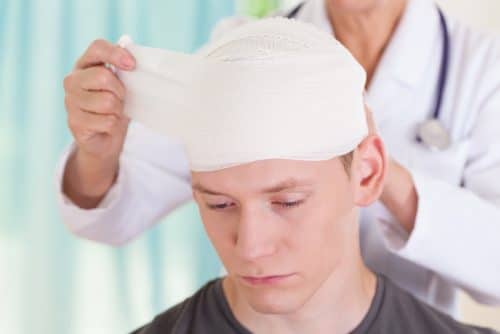Learn what to look for after a head injury so you can get help as soon as possible.

Concussions are an unfortunate result of many types of accidents. A concussion is a type of traumatic brain injury (TBI) that often occurs after a hit to the head, or after a fall where a person’s brain moves quickly back and forth in the skull. They are often the result of car, truck and motorcycle accidents, falls, playing sports and being hit by an object. While concussions are typically not fatal, the effects and impact of a concussion on a person’s life can be very serious.
Understanding the symptoms of a concussion is vital to getting help. By recognizing the signs that a TBI like a concussion has occurred, you can get help for yourself or a loved one — and minimize the risk of lifelong consequences.
What Are the Symptoms of a Concussion?
After an accident involving a blow to the head, it is important to be watchful for signs of a concussion. While some symptoms may appear immediately, others may not be apparent for days, weeks, or even months after the injury. It may not be until a person thinks that they are fully recovered and is back at work that the symptoms fully appear, brought on by the stress of returning to their normal life after an accident.
Concussion symptoms can vary widely depending on the person and the type of injury experienced. They may include difficulty with thinking and processing, regulating mood, or problems with sleeping too much or too little. They can also produce very challenging physical symptoms, such as headaches, nausea, dizziness, balance issues, blurry vision, fatigue, lack of energy, and sensitivity to bright lights or noise. If you have suffered a head injury and are experiencing any of these issues, you should seek medical care as soon as possible.
There are some other signs to watch for that indicate that a concussion may be dangerous. These symptoms include the following:
- Slurred speech
- Inability to recognize people or places
- Seizures
- Numbness or weakness
- Decreased coordination
- Cannot be woken from sleep or appears drowsy
- One pupil is larger than the other
- Prolonged nausea or vomiting
- Confusion, restlessness or irritability
- Loss of consciousness.
If you notice any of these signs in an adult who has suffered head trauma, take him or her to the emergency room immediately. Children should be taken to the emergency room if they have any of these signs, or if they will not eat or nurse, or if they cannot be calmed down.
A concussion can have long-lasting effects, particularly if not treated promptly and appropriately. That is why it is so important to seek medical care any time that you or someone you love receive a blow to the head. Prompt medical attention can help you recover physically and reduce the long-term risks of conditions associated with untreated concussions.
If you have suffered a head injury in a car, truck, motorcycle or bus accident, or any other type of accident, contact the Law Offices of Larry H. Parker at 800-333-0000 or info@larryhparker.com today. We offer free initial consultations, where we will explain your legal rights and options. We have years of experience obtaining millions of dollars in awards and settlements for our clients, and will aggressively pursue your right to compensation.



